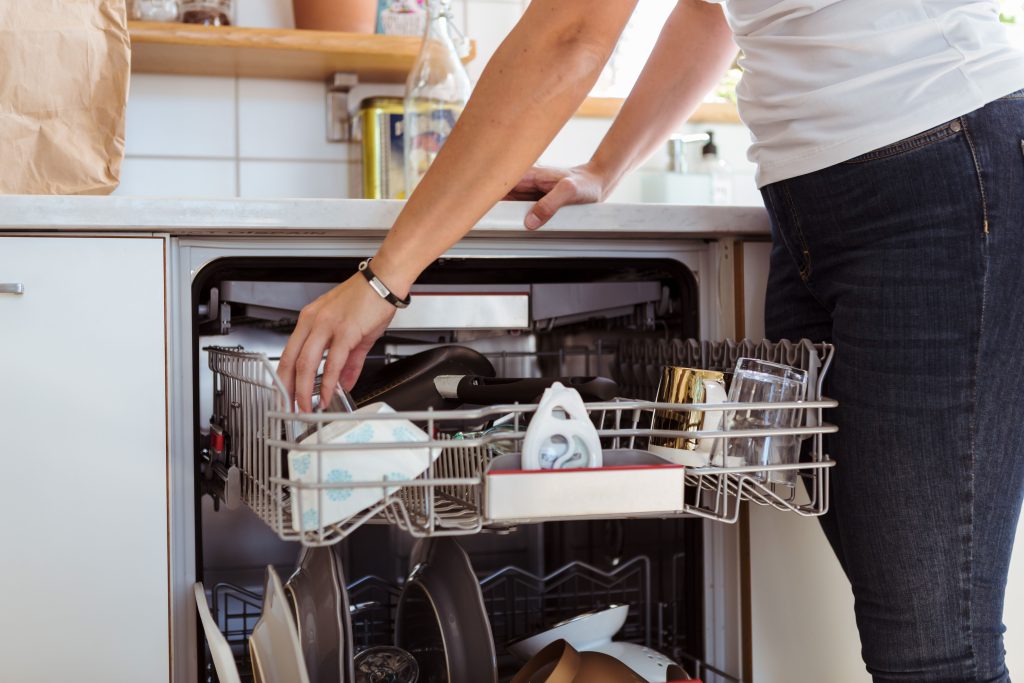Why Is My Dishwasher Not Cleaning Dishes Properly?

In today’s busy households, dishwashers are essential appliances that help maintain a clean and efficient kitchen. However, many users encounter issues when their dishwasher fails to clean dishes properly, leaving behind food particles, food debris, and unpleasant odors. This comprehensive blog explores common causes of poor cleaning performance, the importance of regular maintenance, proper loading techniques, and troubleshooting steps. We also discuss the impact of water quality and the best detergents to use. Read on to learn how to avoid costly repairs and keep your dishwasher operating at its hottest cycle for spotless dishes.
Overview of Dishwasher Repair
It’s important to combine proper maintenance with deep cleaning techniques to ensure your appliances perform at their peak; our appliance repair technician can help you with that. For example, running a dishwasher with bleach on the hottest setting can help remove stubborn food debris. In contrast, a dishwasher with vinegar offers an eco-friendly alternative that effectively combats unwanted smells. Always wear Rubber gloves when handling these cleaning agents and use a dry cloth after a hot cycle to wipe down any remaining residue. Modern dishwashers benefit from hot running water, and if appliance issues arise with your dryer, consider scheduling a dryer repair service. Our experts provide solutions for various maintenance needs at a competitive price.

Common Signs of Poor Cleaning Performance
When your dishwasher fails to clean dishes properly, you may notice:
- Food Residue and Bits of Food: Leftover food particles and food debris accumulate on dishes, often evident on the utensil holder and in the dishwasher tub.
- Unpleasant Odors: A smelly dishwasher with bad smells, foul odours, or nasty odours can result from undissolved detergent and stagnant, soapy water.
- Buildup and Mold: Residual water mixed with food particles and detergent residue creates a breeding ground for mold and bacterial growth, leading to musty, unpleasant smells.
- Poor Performance: Overall performance is hampered, leaving dirty dishes and even affecting other major appliances in your home.
Importance of Regular Dishwasher Maintenance
Regular maintenance is a critical preventative step that helps your dishwasher operate efficiently and extend its lifespan. Neglecting routine cleaning cycles can lead to unwanted residue buildup, reducing performance and causing electrical issues. A well-maintained dishwasher ensures optimal wash cycles and prevents the accumulation of food debris and detergent residue. Routine maintenance involves simple steps such as cleaning the dishwasher filter, inspecting spray arms, and maintaining rubber seals. These tasks, when performed regularly, help avoid costly repairs and ensure that your appliance delivers clean dishes every time.
Cleaning the Filter
Why It Matters
A clogged dishwasher filter is a common issue that leads to poor cleaning performance. Food particles and bits of food can accumulate over time, hampering water circulation and reducing the efficiency of the cleaning cycle.
How to Clean It
- Step 1: Turn off the dishwasher and remove the filter carefully.
- Step 2: Use a damp cloth or a soft-bristle brush to gently remove stuck-on food debris.
- Step 3: Rinse under warm water and, if necessary, soak it in a mixture of dish soap and a cup of white vinegar.
- Step 4: Dry the filter with a soft cloth or paper towel before reinstalling.
Regular cleaning of the filter is a simple yet effective preventative step to ensure cleaner dishes and maintain dishwasher performance.
Inspecting the Spray Arms
Importance of Spray Arms
The spray arms in your dishwasher are responsible for distributing hot water and detergent evenly. Over time, these arms may become clogged with food particles, mineral deposits, or detergent residue.
Cleaning Process
- Step 1: Remove the spray arms as directed by your dishwasher model’s manual.
- Step 2: Use a stiff brush or non-abrasive sponge to clean the holes.
- Step 3: For stubborn clogs, run a cycle with vinegar or citric acid powder to dissolve mineral buildup.
- Step 4: Rinse thoroughly and reinstall, ensuring there is no obstruction to water flow.
Proper cleaning of the spray arms helps maintain the efficiency of both the wash and hot water cycles, ensuring a clean dishwasher.
Maintaining Door Gaskets
Role of Door Gaskets
The rubber seals or door gaskets are essential for preventing leaks and maintaining the water pressure needed for a proper cleaning cycle. Over time, these gaskets can accumulate food debris or develop mold.
Maintenance Tips
- Regular Cleaning: Wipe the door gaskets with a damp cloth or microfiber cloth and a mild dish soap solution.
- Inspect for Damage: Look for signs of mold, cracks, or stiffness. Replace if damaged to avoid water leakage.
- Preventative Care: Use a damp sponge to remove buildup and avoid using harsh chemicals that could damage the rubber.
Taking care of door gaskets ensures that your dishwasher operates efficiently without leakage, preventing unpleasant odours and water residue buildup.
Proper Loading Techniques for Optimal Performance
Arranging Dishes for Water Circulation
The way you load your dishwasher significantly affects its cleaning performance. Improper loading can block the spray arms, leading to food residue and bits of food left on your dishes.
Tips for Arranging Dishes
- Dish Racks: Place dishes in the designated racks without overcrowding.
- Angle Items: Tilt plates and bowls so that water can reach all surfaces.
- Utensil Placement: Arrange utensils in the utensil holder to maximize exposure to the spray.
- Avoid Overloading: Ensure enough space between dishes to prevent obstruction of water and detergent flow.
Avoiding Overloading the Dishwasher
Overloading is a common issue that leads to poor performance. When too many dishes are placed in the dishwasher, it hampers water circulation and results in a dirty dishwasher with food debris remaining on the dishes.
- Key Point: Follow the manufacturer’s guidelines regarding load capacity.
- Result: Proper loading techniques lead to cleaner dishes, reduced food residue, and less risk of buildup that can cause foul odours.
Choosing the Right Detergent for Efficient Service
Types of Dishwasher Detergents
Selecting the appropriate dishwasher detergent is critical for maintaining performance. Options include:
- Liquid Detergents: Suitable for everyday use.
- Dishwasher Tablets: Convenient and pre-measured, but be sure to follow dosage guidelines.
- Powder Detergents: Effective for breaking down food debris and grease.
Dosage Guidelines
- Measure Carefully: Overuse of detergent can cause undissolved residue, leading to a smelly dishwasher and poor cleaning performance.
- Adjust for Load Size: Use less detergent for smaller loads and more for heavily soiled dishes.
- Supplement with Natural Cleaners: Occasionally run a cleaning cycle using a cup of vinegar or a baking soda cycle to eliminate buildup and maintain a clean dishwasher.
Using the correct detergent in the right amount prevents issues such as foam buildup, undissolved detergent, and chemical reactions that might harm the appliance’s internal parts.
Troubleshooting Common Dishwasher Issues
Identifying Clogs in the Drainage System
A common problem in many dishwashers is clogging in the drainage system. Food debris, bits of food, and detergent residue can block the drain, preventing proper water flow.
- Inspect the Drain Filter: Remove and clean the drain filter using a soft-bristle brush.
- Clear Obstructions: Use a paper towel or damp cloth to remove clogs and ensure that the dishwasher drain is free of unwanted residue.
- Cycle with Vinegar: Running a cleaning cycle with vinegar can help dissolve any stubborn buildup.
Checking for Malfunctioning Parts
Sometimes, poor cleaning performance is due to malfunctioning components such as spray arms, dishwasher filter, or damaged rubber seals.
- Examine the Spray Arms: Look for blockages or damage that could impede water spray.
- Assess the Filter: Ensure that the dishwasher filter is clean and free from food debris.
- Inspect Door Gaskets: Check for signs of wear or mold. Replace if necessary.
- Professional Diagnosis: If problems persist, consult expert technicians or professional Appliance Repair Services to diagnose potential electrical issues or component failures.
Understanding Water Quality’s Impact
Effects of Hard Water on Cleaning
Hard water, rich in minerals, can have a significant negative impact on dishwasher performance. These water minerals can:
- Cause Mineral Buildup: Deposits on dishes, spray arms, and the dishwasher filter can reduce cleaning efficiency.
- Reduce Detergent Effectiveness: Hard water reacts with dishwasher detergent, leading to undissolved detergent residue and diminished cleaning power.
- Leave a Film on Dishes: The buildup of minerals can cause a cloudy film on your dishes, affecting their appearance and cleanliness.
Solutions for Hard Water Problems
- Use Dishwasher Salt: This can help soften water and improve the performance of your cleaning cycle.
- Rinse Aid: Adding a rinse aid helps reduce water spots and improves drying.
- Cleaning Cycles: Regularly run a cycle with white vinegar or citric acid powder to break down mineral deposits.
- Commercial Cleaners: Consider using products like Cascade Platinum Dishwasher Cleaner to effectively remove hard water buildup.
- Maintenance Check: Periodic maintenance can prevent the detrimental effects of hard water, ensuring a clean dishwasher and reducing the risk of mold and bad odors.

Why Choose Toronto Refrigeration for Your Dishwasher Repair?
When your dishwasher fails to perform as expected, it can affect your daily routines and result in costly repairs if left unattended. Toronto Refrigeration provides affordable appliance repair services with a focus on exceptional customer service and efficient, expert repairs. Our experienced technicians are skilled in diagnosing and resolving issues related to dishwasher filters, spray arms, rubber seals, and drainage systems. We employ state-of-the-art techniques, such as running cycles with vinegar, baking soda, or even a cup of bleach when necessary, to ensure your appliance operates at its peak performance. Trust us to deliver efficient and reliable dishwasher repairs that restore your appliance to optimal functionality.
Conclusion
In conclusion, a dishwasher that does not clean dishes properly is often plagued by issues like clogged filters, blocked spray arms, worn door gaskets, and hard water buildup. Regular maintenance using proper loading techniques, the right detergent, and periodic cleaning cycles with white vinegar or baking soda can dramatically improve performance and prevent mold and food residue buildup. Toronto Refrigeration’s expert technicians provide dependable Appliance Repair Services that address these common issues, ensuring your dishwashers deliver spotless, clean dishes every cycle while preventing costly repairs.